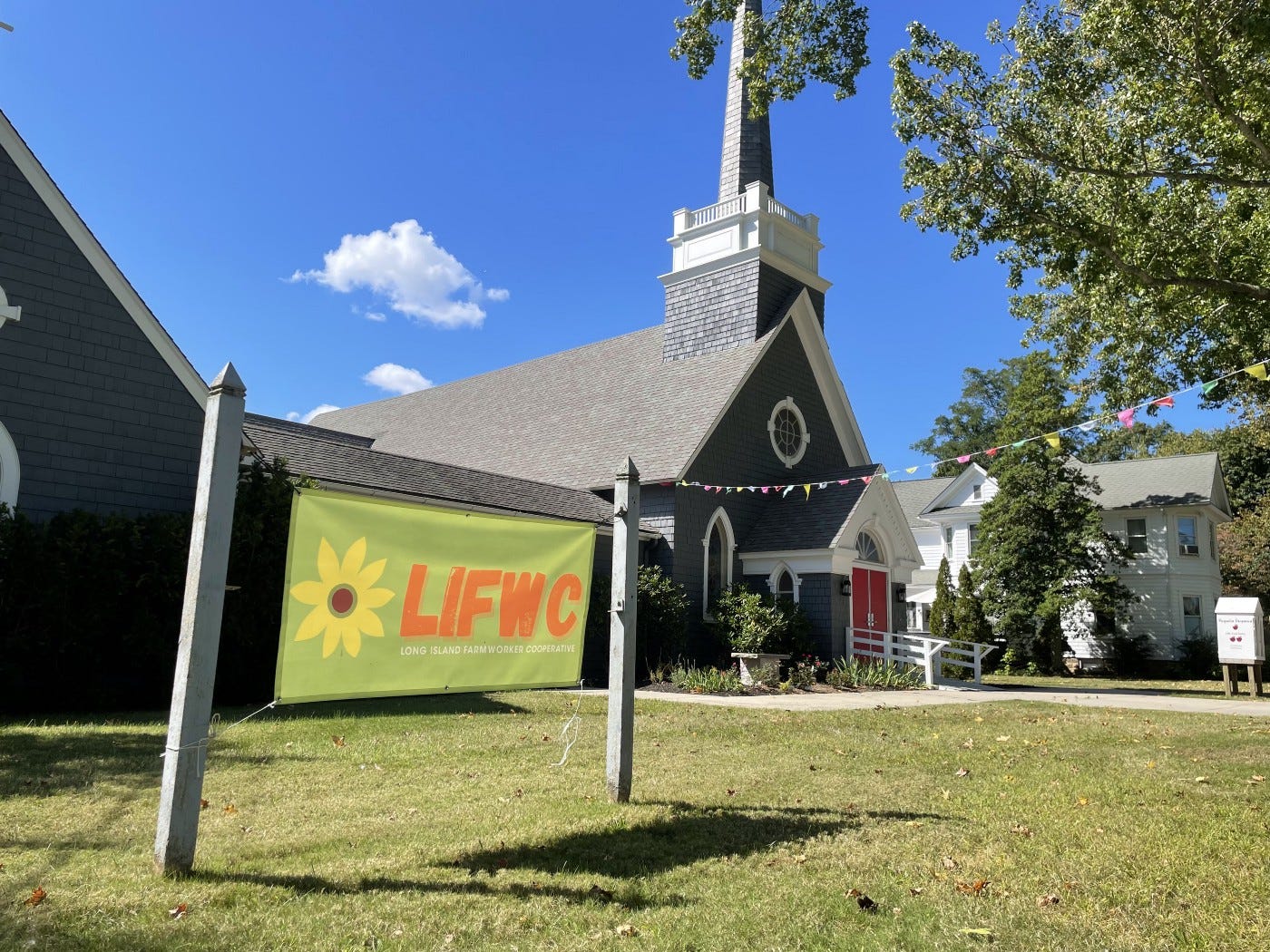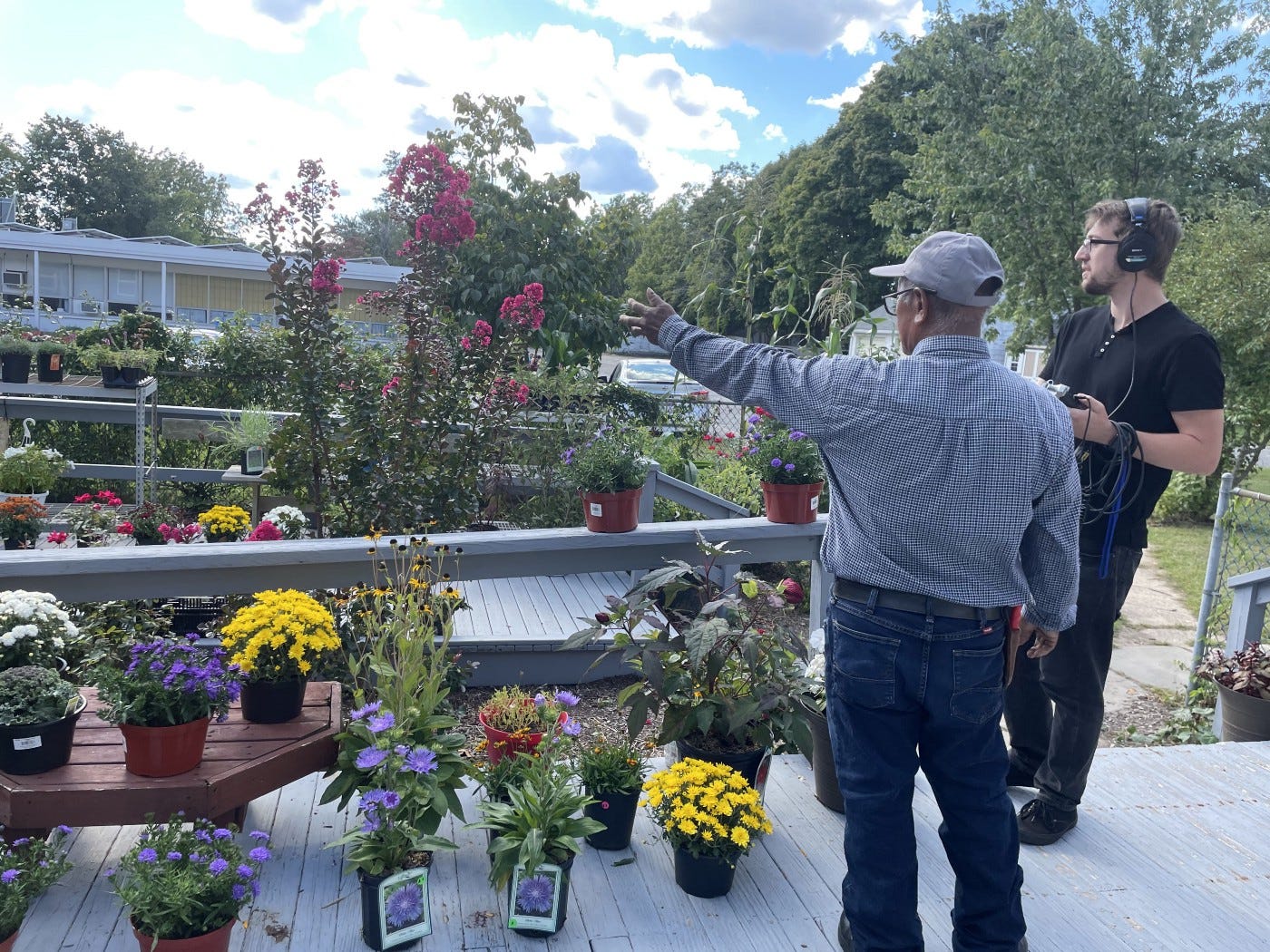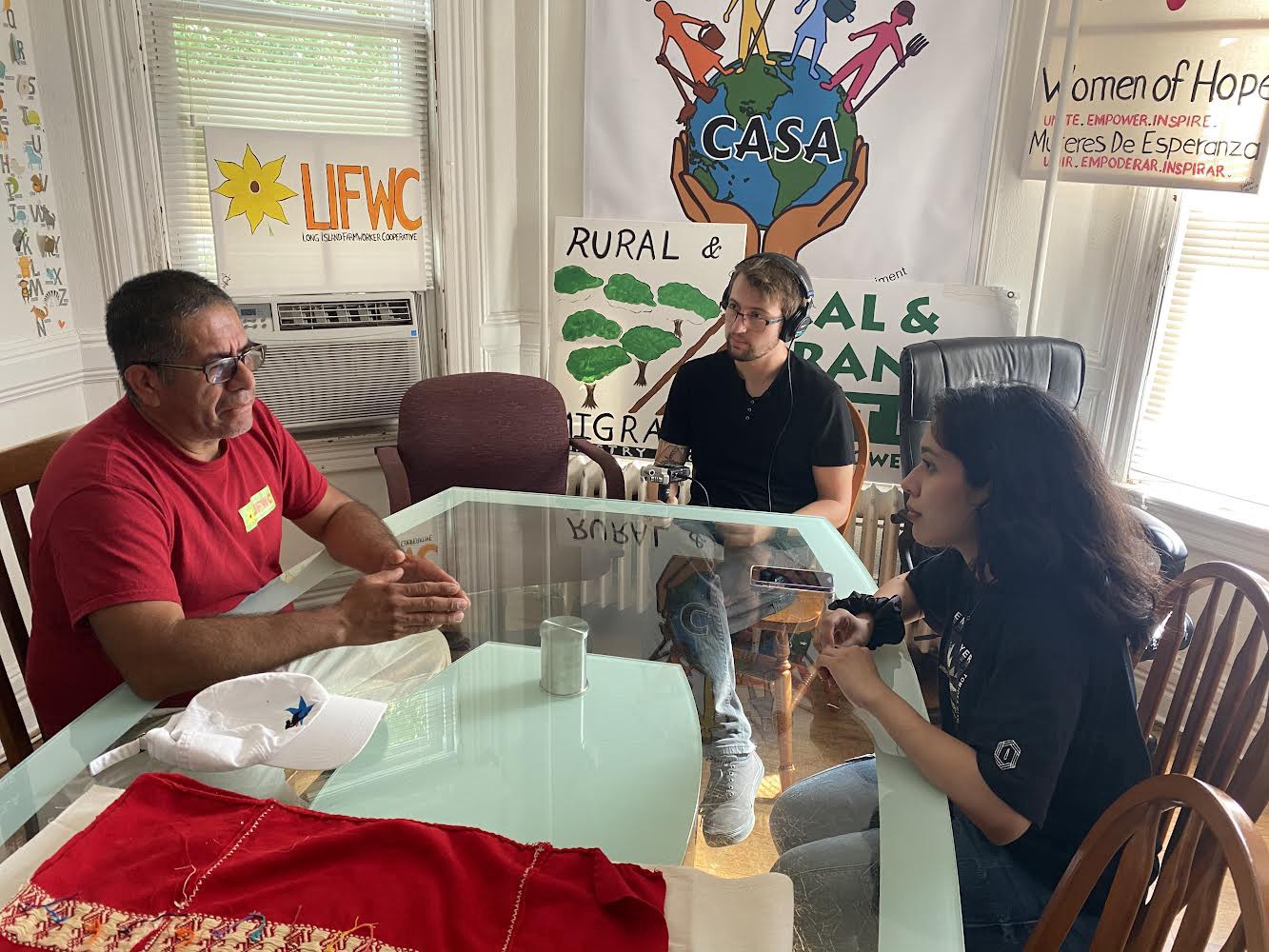By Damali Ramirez
On Long Island’s East End, a small group of immigrant and migrant workers formed the Long Island Farmworker Cooperative. The cooperative represents farmworker empowerment battling a long history of mistreatment of the workers who feed the public.
Members of the cooperative say they hope to own their land and greenhouses in the future by growing and selling plants to raise revenue. In the podcast below, I sought to tell their story.

TRANSCRIPT
MUSIC: Huelga En General General Strike intro music**
INTRO:
For almost a century, immigrant and migrant farm workers in New York have worked without labor protections and other legal guarantees afforded to other sectors. For almost 80 years, the state has allowed farm workers to work in poor labor conditions with little recourse to defend their rights, simply because of their immigration status.
BUT New York is not the only place where labor rights of farm workers are being violated. The U.S. has a long history of mistreating the farm workers that feed the nation. And it is accompanied by a long history of farm workers organizing for their rights.
On the East end of Long Island, a small cooperative made up of immigrant workers from Central America and Mexico are taking steps to community empowerment. They’re working and saving to own their land and greenhouses. Hi, I’m Damali Ramirez and I’ve spent the last few months looking into the farm workers organizing on Long Island. After months of talking to the activists and experts, I’ve prepared this report about at their work.
MUSIC UP -**Huelga En General General Strike**
AMBIENT SOUND = FARM
NARRATION:
I’m on the East End of Long Island in a town called Riverhead. As I drove around the town, I noticed the various farms, large crop fields, and more pumpkin patches than I could count. I got lost trying to find the Long Island Farmworker Cooperative’s home. After half an hour of asking the town people for directions, I made my way to the Amandla Center, formerly known as Grace Episcopal Church.
In front of the church, there’s a light green banner displaying the Long Island Farmworker Cooperative’s name. The grey church isn’t big, but it also isn’t small. On the right side of the church, there’s another sign promoting the flower market, displaying the hours of operation and social media branding.

I will be frank, when I got to the cooperative’s location, it wasn’t how I pictured it. I imagined large fields of crops and animals roaming around. I was getting ready to come home with my shoes covered in dirt. Maybe you can tell I’m from Brooklyn. Instead, I found a group of little kids outside paging through Bibles bigger than them.
AMBIENT SOUND = pages flipping
NARRATION:
In front of them were dozens of flowers of various sizes and colors, some of which I’ve never seen or heard of.
AMBIENT SOUND = Juan Antonio Zuñiga describing the flowers (play under)
NARRATION:
That’s Juan Antonio Zuñiga, the director and co-founder of the cooperative describing the flowers he and his co-workers are selling at the church.

AMBIENT SOUND = Juan Antonio Zuñiga describing the flowers (play up)
NARRATION:
Despite my sudden, unexpected visit to the house, the cooperative members happily opened their doors and treated me like family. As I sat in a room waiting to interview them, I could not help but notice the walls covered in posters of farmworker organizations and activists. The more I looked around the room, the more I wondered how and why these groups of immigrant farm workers decided to form a cooperative.
CUT # 1A: Juan Antonio Zuñiga
“I’ve lived an experience as a cooperative member of 60 associates but not here, my home country El Salvandor.”
NARRATION:
Juan Antonio Zuñiga came to New York in 1991, roughly 30 years ago after fleeing violence from El Salvador. For him, starting the cooperative on Long Island came naturally.
CUT # 1B: Juan Antonio Zuñiga
“Because of that experience, we had the idea to start the project. Now, we’re new, tiny and growing.”
NARRATION:
Zuñiga got together with the Rural and Migrant Ministry about three years ago when it started doing outreach in the community and connecting with workers on Long Island. Angel Reyes is the Long Island Coordinator for the Rural and Migrant Ministry, or RMM:
CUT #2: Angel Reyes
The Rural and Migrant Ministry is a nonprofit. It’s a statewide nonprofit organization that works with rural communities. So mainly focusing on rural workers, farmworkers but we work with rural, disenfranchised communities. And our work is a leadership development, it’s really providing space for the communities to develop their own leadership, and we do that through popular education.
NARRATION:
Juan Antonio pushed Angel into looking at cooperativism. Cooperatives are associations of people who unite voluntarily to meet their economic, social, cultural needs and aspirations through a jointly-owned and democratically controlled enterprise. In Latin American countries, cooperatives have been on the rise, in particular the agricultural sector.
CUT #3: Miguel Flores
“In this country, you work more than any other country because you pay for everything. You want a fruit? You have to buy it. In this country there isn’t a culture that emphasizes the importance of sharing. It’s a cultural thing. When you go to the table, you don’t ask the other person in the room if they want anything to eat. This country is individualistic.”
NARRATION:
That was Miguel Flores, one of the first members that joined the cooperative. Miguel came to the United States in 1999 after his family was struggling economically in El Salvador. Even after Miguel adjusted to the American culture, he still missed his home’s culture that embraced the importance of sharing. We’ll get back to his story in a bit.
Even though Angel wanted to help start the cooperative, he didn’t know how at first because his background was more in advocacy work. So, he encouraged Juan Antonio to talk to other members and see if they’d hop on board.
And so, Juan Antonio did manage to convince seven other farmworkers to join the cooperative. Ever since, Angel has been helping cooperative members learn everything about agriculture as a business, that includes sales, finance, accounting, and more to become producers. In addition, Angel helped the cooperative launch their first official flower sell, which they hold every Sunday at the church. The group currently purchases plants from immigrant-owned nurseries. They plan to save the profit from the plant sales to buy their land and green houses.

CUT #4A: Angel Reyes
“In mean, they started December last year, meeting but the official first flower sold was May 2. So they’ve been doing that for the last few months every Sunday. They have also supported different events, different events in the community, providing flowers and things like that. And right now, they’re in the process of acquiring land, and building the greenhouses.”
NARRATION:
It’s still unclear as to when the cooperative will purchase their own land. As of now, they’re in the talks with partnering with the Sisters of Saint Joseph in Brentwood. If everything goes as planned, the cooperative will be traveling to Brentwood to grow their plants. For Reyes and the other cooperative members, their challenge was unbelievably difficult given the cooperative’s location on the East End of Long Island:
CUT #4B: Angel Reyes
“You know Long Island is crazy, trying to start, like cooperative on Long Island is crazy, because it might be the most expensive real estate in the world, right. So, they, we knew that having the goal of getting land was going to be a little bit of a challenge, because of that, but we decided to keep moving forward with it.”
NARRATION:
Now back to Miguel. Miguel comes from a large family, he has six brothers and three sisters. His family has a long history of working in the agricultural industry. And so, 10 years ago after working in other sector, he decided he wanted to go back to his roots in the agricultural industry. However, one of the first few obstacles he faced was adjusting to the cultural environment and learning English.
CUT #5: Miguel Flores
“In this country, you can do everything. In this country, there is room for everyone. One thing I want to tell the public is that we’re admirable because we’ve learned the language. Because with or without papers, if you don’t know the language, you won’t progress in life. Give immigrants a chance. Unfortunately, politics today isn’t just politics. It’s life and there are problems happening at the border and it’s been happening for decades. It’s always been that way and people aren’t going to stop migrating here.”
NARRATION:
Miguel is a temporary protection status recipient, also known as TPS. TPS is granted by the secretary of the Department of Homeland Security to foreign-born individuals. These individuals are unable to return home because of conditions or circumstances preventing their return to the country.
CUT #6: Miguel Flores
“For 20 years, I’ve been a temporary protected status holder. I’m the TPS community, but the previous administration emphasized it was a temporary status and nothing more. And that’s why I started to organize for immigrant rights and met people in RMM.”
NARRATION:
Despite accomplishing the American dream, Miguel fears if he ever forgets to refile his temporary protection status paperwork, he will lose everything he’s worked hard for. After listening to Miguel’s and Juan’s stories and the difficulties they experienced in the United States, it became clear why the group felt empowered to own their land and greenhouses.
Their dream is directly connected to the long history of immigrant farm workers on Long Island and the struggles in building a just workplace. Author and attorney Mark Torres knows a lot about this history. This year, Mark Torres published his fourth book, “Long Island Migrant Labor Camps: Dust for Blood.” In the book, he details the history of the first migrant labor camps in Suffolk County. It is the first documented book explaining the unjust conditions migrant workers on the East End of the Island were forced to work under.
CUT #7: Mark Torres
“Well, I first learned about the camps in 2015, with the writing of my first book, starting in the North Fork. And I actually included the Cutchogue labor camp, which is the largest camp in New York State, certainly on Long Island during that era. I always realized I wanted to go back to that history, because I knew there was a it was certainly at the time, I thought, Well, this has potential to be very important and large, deep history, and I and I, at the time, assume that there’ll be much coverage on it.”
NARRATION:
Eventually, he did circle back to the history during the pandemic.
CUT #7B: Mark Torres
“I was shocked and dismayed to find out that there was nothing written on it in a comprehensive way, but remain undeterred with the much great deal of research on the book, which included reviewing over 300 newspaper articles, several read documentaries I’ve studied, as well as interviews, and other government data sources I could find, to kind of put this book together and in a digestible, comprehensive format that covers the history that deserve to be covered.”
NARRATION:
For decades, thousands of migrant workers were lured by promises of good wages and housing on eastern Long Island. Instead, they were cheated out of pay and housed in deadly slum-like conditions. These camps were also run by a crew leader system. Crew leaders would recruit farmworkers from different states and then have complete control of the workers’ lives, pay, food, housing, and everything else.
The camps ended as the machinery era rose, causing less manpower to be needed. Although Mark Torres’s book covers 1943 to 2000, he did mention the demographic change we see in today’s agricultural industry. In the early 1940s, migrant workers were exclusively from Jamaica. Mexican and Puerto Ricans were shifting Black U.S. workers out of the industry as time went on. And now, Central Americans make up the majority of today’s farmworker population on Long Island.
It is these approximately 7,500 farm workers that were unprotected in the labor market up until 2020. In 2019, the New York State Legislature finally passed a bill that would protect them, and it was signed into law a year later.
CUT #8: Mark Torres
“I’ll point out that farmworkers up until today, at this moment, do not fall under the National Labor Relations Act. So, they get no coverage under the federal labor law. It wasn’t until 2020 when the New York Farm Laborers Fair Labor Practices Act finally passed 78 years after the opening of the first camp.”
NARRATION:
But how was this possible, and why did it take 78 years for farmworkers in New York to get state protection? The more I asked around, I kept hearing two names that played an influence: Cesar Chavez and Dolores Huerta.
NEWSREEL OF CALIFORNIA FARM MOVEMENTS
NARRATION:
So now, you’re probably asking yourself, what do activists in California have to do with New York?
CUT #9: Lori Flores
“In the 1960s, Cesar Chavez and Dolores Huerta were both part of an organization called the Community Services organization, or the CSO, in Southern California. And that organization was one in which they were working on trying to get people to register to vote in the Mexican American community in California to be able to have their voices heard in the political sphere and elect their representatives.”
NARRATION:
That’s author and Stony Brook University professor Lori Flores, no relation to Miguel Flores. She focuses her studies on Latinx life, labor and politics in the United States from the post-World War II era to the present day. She says the United Farm Worker organizing came at a different era in terms of U.S. migrant policies.
CUT #9B: Lori Flores
“But also another aim of it was to listen to the concerns of agricultural workers in California communities like Delino, which is where they were based. And the problem at the time of the early 1960s, that was still continuing was the importation of Mexican guest workers or braceros into the fields of California and other states in the US. And with these guest workers, employers were hiring them to work in agriculture for cheaper wages, they were not allowed to be unionized. They lacked a lot of rights and protections. And so, the more that employers hired braceros, the less that they were employing U.S. residents or citizen workers. And so, this was affecting Mexican American, Filipino Americans, other people who were in the United States already and in need of agricultural jobs as well.”
NARRATION:
Flores reminded me of the tragic irony of the organizing work of the United Farmworkers. She says that they were providing the food for the nation but lack basic worker rights and representation.
CUT #10: Lori Flores
“The union pointed out this irony that farmworkers were helping to provide the food and nourish the nation with their labor. And then went so undernourished themselves when it came to their rights when it came to being able to afford healthy food for themselves and their families. And so the idea of the boycott of certain foods like grapes and lettuce, was so that the ordinary consumer could make the choice not to buy nonunion grapes and lettuce in the stores. And by supporting the United Farmworkers, which, you know, let politicians know in Congress, that a United Farm Workers Union was something that the American public supported. So in a nutshell, that’s how the farm worker movement began in California and how it spread to the rest of the US.”
NARRATION:
The farm worker movement in California was multifaceted movement, fighting for voter rights, the right to unionize, better working conditions and more. Here on Long Island, farmworkers are fighting for better working conditions and a better overtime rate. RMM and other organizations showed the importance of creating a state protection law. So that brings us to New York in 2020 at the height of the pandemic. Farm workers were in the spotlight being recognized as essential workers. Flores says it did take New York long to pass a bill regarding farm workers.
CUT #11: Lori Flores
“It has taken an incredibly long time for New York to pass anything related to farmworkers. I think it’s because like other states, like California, and New York has had a really, really long history of benefiting from the labor of different waves of vulnerable workers over time. And I think, you know, because New York, like other states have harvest, that are just for a short amount of time, or the window for harvesting is so short, that there has been no push to have an aim act or a piece of legislation that protects agricultural workers year round, no matter what, because I think a lot of people see these workers as temporary, people who are passing through.”
NARRATION:
The Farm Laborers Fair Labor Practices Act was passed in 2019 and went into effective in 2020. The law is designed to protect farmworker rights and ensure equitable housing and working conditions for agricultural workers. Despite the positive measure, advocates say there’s still room for improvement in the law.
CUT #12: Angel Reyes
“And we were able to accomplish in 2019, the passage of the bill that gave farm workers the right to over time. There were some compromises when it comes to overtime, we’re still fighting through, but we were able to get them in You know, over time, and and also we were able to accomplish, the right for collectively bargaining for farm workers.”
NARRATION:
The bill states overtime is counted after workers hit the 60 hours mark. Lori also thinks New York and other states need to improve and increase the Occupational Safety and Health Administration (OSHA) staff. OSHA is a regulatory agency in the U.S. that inspects and examines workplaces. However, the reality is agricultural workers are still afraid to speak out about their working conditions.
CUT #13: Lori Flores
“It’s still a reality that, you know, agricultural workers still endure a lot of toxic conditions when it comes to hazards that they face at work, to toxic chemicals and pesticides to different, you know, lacks of protection when it comes to their medical care and their health care. And then they’re afraid to speak out because they’re afraid, you know, because whether it’s citizenship status, or just the economic situation, they’re afraid to lose their job, if they speak out about an injury or an illness, or something that’s making them feel unsafe or uncomfortable at work.”
NARRATION:
Now more than ever, it’s crucial New York and the United States do not forget the importance of farmworkers. During the pandemic we saw the importance and necessity of these workers. Without them, there wouldn’t be food on our supermarket shelves or table.
CUT #14: Angel Reyes
“There has been a lot more publicity now, because of the pandemic on the role that farm workers play in society. Right, and how fundamental the role of farm workers is. And also, we have been able to call them essential now. So I think that by calling them essential workers, we’re just having as a society, a different understanding of their role. And, and I think they have shown that despite any crisis, they still have to come out, they still have to do and in a way serve the overall community purpose, which is feeding people, right. And I think that’s something that let’s say, the pandemic slows down and things go back somewhat normal that needs to still be present in people’s minds, right, and that still need to be present as a society, how fundamental the role is.”
NARRATION:
Members of the cooperative understand the long and difficult journey they embarked on. It is the continuous of the long history of farm worker organizing on Long Island. Unjust wages, difficult working conditions, and lack of representation have pushed these workers to became independent. They’re also continuing the fight to address the issue of overtime wages. For them the growth of the cooperative and their partnership with the Sisters of Brentwood is their best hope for a just and sustainable future.
For the Long Island Advocate, I’m Damali Ramirez.
MUSIC: music fades out
Voiceover narrators: Alonso Rosado as Juan Antonio Zuñiga and Hunter Spears as Miguel Flores.
Special thanks to Hunter Spears for helping with this story.









